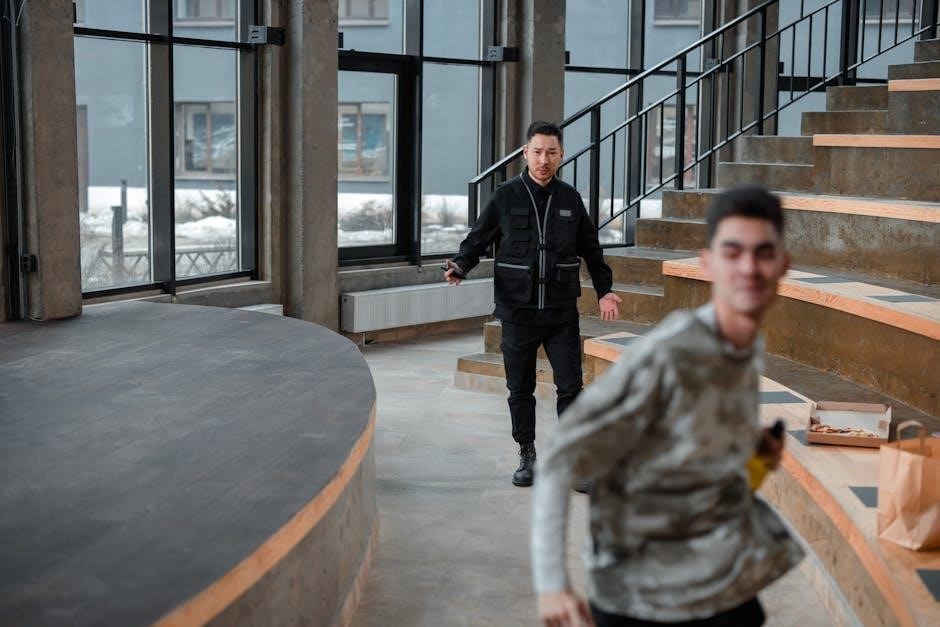
security guard duties and responsibilities pdf
Security guards play a crucial role in maintaining safety and order by preventing threats, monitoring premises, controlling access, and responding to emergencies efficiently and responsibly.

General Responsibilities of Security Guards
Security guards are responsible for maintaining safety, patrolling premises, monitoring surveillance, controlling access, and responding to emergencies to ensure a secure environment for personnel and assets.
2.1. Maintaining a Safe and Secure Environment
Maintaining a safe and secure environment is a primary duty of security guards. They ensure the well-being of individuals and the protection of property by identifying and mitigating risks, enforcing safety protocols, and adhering to emergency procedures. This involves monitoring premises, addressing hazards, and preventing unauthorized access. Guards also play a key role in crisis management, responding swiftly to incidents such as fires or medical emergencies; Their vigilance helps maintain order, deters criminal activities, and fosters a secure atmosphere for everyone. By upholding safety standards and being proactive, security guards contribute significantly to the overall security and stability of their assigned locations.
2.2. Patrol and Inspection of Premises
Patrolling and inspecting premises are essential tasks for security guards to ensure comprehensive safety and security. Regular patrols involve walking through buildings and surrounding areas to detect and address potential risks, such as safety hazards, unauthorized individuals, or suspicious activities. Guards also inspect equipment, surveillance systems, and access points to ensure functionality and security. These activities help maintain a visible security presence, deter criminal behavior, and provide a sense of safety for occupants. Documentation of patrol routes and findings is often required, allowing for effective incident tracking and problem-solving. Consistent and thorough patrols are vital for preventing threats and maintaining a secure environment.
2.3. Monitoring Surveillance Equipment
Monitoring surveillance equipment is a critical responsibility of security guards, enabling them to detect and respond to potential threats in real-time. Guards observe CCTV feeds, alarms, and motion detectors to identify suspicious activities or breaches. They ensure all systems are operational, reporting technical issues promptly to maintain security integrity. This duty requires attention to detail and quick decision-making to address incidents effectively. By continuously surveying the premises, security guards can prevent unauthorized access, vandalism, or criminal activities. Their vigilance ensures the safety of people and assets, making surveillance monitoring a cornerstone of modern security practices; Effective monitoring also aids in investigating incidents, providing valuable evidence for resolution. Thus, security guards play a pivotal role in safeguarding environments through constant surveillance oversight.
2.4. Access Control and Authorization
Access control and authorization are fundamental duties of security guards, ensuring only authorized individuals enter restricted areas. Guards verify identities, check credentials, and maintain logs of entries and exits. They operate security systems, such as electronic access cards and biometric scanners, to prevent unauthorized access. Guards also manage visitor registration, issuing passes and ensuring compliance with security protocols. In case of discrepancies or suspicious behavior, they deny entry and escalate incidents. Effective access control safeguards sensitive information, property, and personnel from potential threats. Security guards must stay vigilant, balancing courtesy with strict adherence to protocols to maintain a secure environment while providing a welcoming atmosphere for legitimate visitors. Their role in access control is essential for preventing breaches and upholding organizational security standards.
2.5. Emergency Response and Incident Management
Security guards are essential in responding to emergencies and managing incidents effectively. They are trained to handle various situations, such as medical emergencies, fires, and security breaches. Guards must quickly assess situations, provide immediate assistance, and ensure the safety of everyone involved. They coordinate with emergency services, such as police and paramedics, to resolve incidents efficiently. Additionally, guards document incidents, including details of what occurred, actions taken, and outcomes. This documentation is crucial for investigations and improving future responses. Their ability to remain calm under pressure and act decisively helps minimize risks and prevent escalation. Effective emergency response and incident management by security guards are vital for protecting lives, property, and maintaining order during critical situations. Their role in these moments is indispensable, ensuring timely and appropriate actions are taken to safeguard all stakeholders. Proper training and preparedness are key to their success in these high-stakes scenarios.
Specific Duties of Security Guards
Security guards are responsible for observing and reporting suspicious activities, preventing unauthorized access, assisting staff and visitors, and handling incidents while collaborating with law enforcement when necessary.
3.1. Observing and Reporting Suspicious Activities
Security guards must remain vigilant, observing surroundings for unusual behavior or potential threats. They document and report such incidents promptly, ensuring detailed accounts for further investigation. This duty is critical in preventing crimes and maintaining safety, requiring keen observational skills and clear communication to convey findings effectively to supervisors or law enforcement. Regular training helps guards identify suspicious patterns and respond appropriately without overstepping their authority. Their reports often serve as vital evidence in legal proceedings, emphasizing the importance of accuracy and thoroughness. By staying alert and proactive, security personnel play a key role in safeguarding people and property, upholding their primary responsibility of protection and deterrence. Their efforts ensure a secure environment, fostering trust and safety within the community they serve.
3.2. Preventing Unauthorized Access
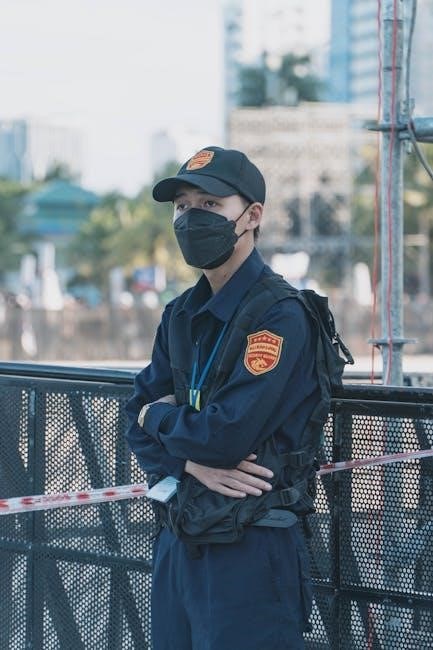
Preventing unauthorized access is a fundamental duty of security guards, ensuring only authorized individuals enter restricted areas. They monitor entry points, verify identities, and enforce access protocols. Guards utilize tools like ID scanners, access cards, and biometric systems to validate credentials. They maintain detailed logs of all entries and exits, enhancing accountability and security. In cases of unauthorized attempts, guards intervene promptly, detaining individuals if necessary, and report incidents to supervisors. Their presence deters trespassing and ensures compliance with security policies, safeguarding sensitive information and physical assets. By controlling access effectively, security guards contribute to a secure and organized environment, minimizing risks and maintaining operational integrity. Their vigilance is essential in protecting premises from potential threats and ensuring the safety of personnel and property.
3.3. Assisting Staff and Visitors
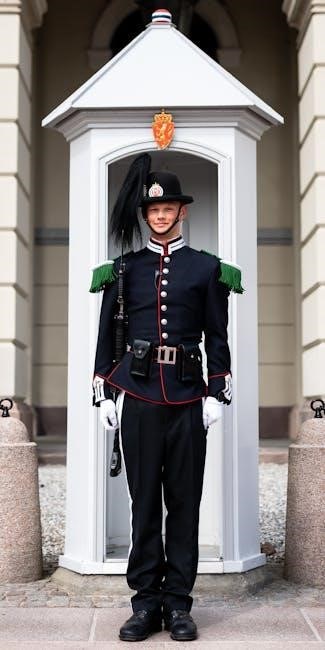
Security guards often serve as the first point of contact for staff and visitors, providing assistance and ensuring a smooth experience. They offer directions, answer inquiries, and help resolve minor issues promptly. Guards also manage Lost and Found services, ensuring items are securely stored and returned to rightful owners. In case of medical emergencies or accidents, they provide immediate support until professional help arrives; Additionally, guards may assist with event coordination, crowd control, and parking management. Their role extends to helping staff with logistical tasks, such as moving equipment or delivering messages. By being approachable and knowledgeable, security guards enhance the overall safety and convenience for everyone on the premises, fostering a positive and secure environment. Their assistance is vital for maintaining operational efficiency and visitor satisfaction.
3.4. Handling Security Incidents
Security guards are trained to effectively manage and resolve security incidents, ensuring safety and minimizing disruptions. They respond promptly to alarms, disturbances, or breaches, assessing situations to determine appropriate actions. Guards document incidents thoroughly, providing detailed reports for further investigation. They also coordinate with law enforcement and other authorities when necessary, ensuring legal procedures are followed. In cases of conflict, guards employ de-escalation techniques to reduce tensions and prevent escalation. Additionally, they secure areas to prevent further risks and provide support to affected individuals. Their ability to remain calm and act decisively is crucial in maintaining order and protecting property. Effective incident handling by security guards helps restore normal operations quickly, safeguarding both people and assets. Their role in managing security incidents is vital for maintaining a secure environment.
3.5. Collaborating with Law Enforcement
Security guards often work closely with law enforcement agencies to ensure public safety and address criminal activities. They provide critical information and assistance during investigations, helping to identify and apprehend suspects. Guards may also participate in joint patrols or community safety initiatives, fostering a collaborative relationship with police. By sharing intelligence and coordinating efforts, security guards enhance the effectiveness of law enforcement operations. They are trained to communicate effectively with officers, ensuring seamless cooperation during emergencies or incidents. This collaboration not only strengthens security measures but also builds trust between the community and law enforcement. Security guards play a vital role in supporting police efforts, contributing to a safer and more secure environment for everyone. Their ability to work alongside law enforcement is essential for maintaining order and justice in society;

The Importance of Security Guards in Modern Society
Security guards are vital in safeguarding lives, property, and assets, ensuring public safety, and preventing criminal activities, thereby maintaining stability and trust within communities globally every day.
4.1. Deterrence of Criminal Activities
The presence of security guards significantly deters criminal activities by creating a visible and active security presence. Criminals are less likely to target locations with professional security personnel. Guards monitor access points, patrol premises, and use surveillance systems to identify suspicious behavior, thereby preventing potential threats. Their proactive approach ensures early detection of risks, minimizing the opportunity for crime to occur. Additionally, security guards maintain a safe environment by addressing unauthorized access and ensuring adherence to safety protocols. Their role in observing and reporting irregular activities further strengthens the overall security framework, making them a critical component in crime prevention and public safety. This visible security measures act as a strong deterrent to potential criminals, thus safeguarding both people and property effectively.
4.2. Ensuring Public Safety
Security guards are instrumental in ensuring public safety by maintaining order and addressing potential risks. They patrol premises, monitor surveillance systems, and respond promptly to emergencies, creating a secure environment for everyone; Guards also assist staff and visitors, providing guidance and support during incidents. Their role in preventing unauthorized access and handling security incidents contributes to overall safety. By collaborating with law enforcement and other teams, they enhance public safety measures. Regular inspections and monitoring of facilities, including HVAC and fire systems, ensure a safe setting. Security guards are essential in safeguarding both people and property, making their presence vital for maintaining public safety effectively.
4.3. Protecting Assets and Property
Security guards are essential in safeguarding assets and property by preventing unauthorized access and potential damage. They patrol premises, monitor surveillance systems, and inspect buildings to identify and mitigate risks. Guards ensure that facilities, equipment, and resources remain secure, reducing the likelihood of theft or vandalism. By controlling access points and verifying authorization, they protect sensitive areas and valuable assets. Additionally, security guards respond to emergencies, such as fires or breaches, to prevent further damage. Their role in maintaining order and addressing threats ensures the preservation of property and assets. This contributes to a secure environment where operations can function smoothly without disruption. The presence of security guards acts as a visible deterrent, further enhancing the protection of assets and property. Their duties are critical in maintaining the integrity and safety of the premises they safeguard.

Challenges Faced by Security Guards
Security guards face challenges such as high-stress environments, managing emergencies, limited authority, and continuous training to adapt to new threats and technologies, ensuring effective security operations.
5.1. High-Stress Situations
Security guards often operate in high-stress environments, where they must respond to emergencies, manage unpredictable situations, and make quick decisions under pressure. These scenarios can include active threats, medical emergencies, or violent confrontations, requiring guards to remain calm and composed. The constant vigilance and responsibility to protect people and property can lead to mental and physical strain over time. Additionally, the unpredictable nature of their work means guards must be prepared to handle crises at any moment, which can be emotionally and physically exhausting. Proper training and support are essential to help guards manage these stresses effectively and maintain their ability to perform their duties safely and professionally. The psychological and physical demands of high-stress situations highlight the importance of adequate resources and protocols to ensure guards’ well-being while they protect others.
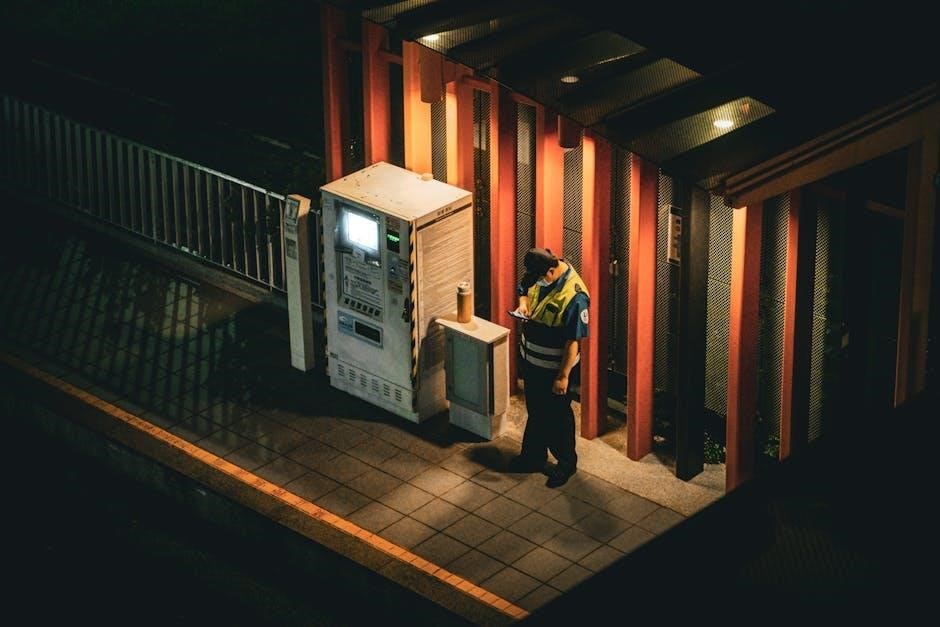
5.2. Limited Authority and Responsibilities
Security guards operate within a defined scope of authority, which often limits their ability to take certain actions. Unlike law enforcement officers, they typically lack the power to make arrests or conduct searches without specific authorization. Their primary role is to observe, report, and deter potential threats rather than enforce laws directly. This limitation can create challenges, especially in situations where immediate intervention is required. Guards must understand their legal boundaries to avoid overstepping their roles, which could lead to legal consequences. Additionally, their responsibilities are focused on preventive measures, such as monitoring surveillance systems, patrolling premises, and managing access control. While their authority is restricted, their role remains critical in maintaining security and ensuring compliance with organizational policies and procedures. Balancing these limitations while effectively safeguarding people and property requires clear communication and collaboration with other security personnel and law enforcement when necessary.
5.3. Continuous Training and Adaptation
Security guards must undergo continuous training to stay updated on best practices, legal requirements, and emerging threats. This ensures they can adapt to evolving security challenges effectively. Training often covers emergency response, surveillance techniques, and the proper use of security equipment. Guards must also learn to operate new technologies, such as advanced surveillance systems, to enhance their performance. Adaptation is crucial, as security environments can change rapidly due to new threats or organizational needs. Regular drills and scenario-based exercises help guards develop the skills needed to handle high-stress situations confidently. Additionally, staying informed about local laws and regulations ensures they act within their authority while respecting human rights. Continuous training not only improves individual competence but also strengthens the overall security framework, enabling guards to provide reliable protection for people and property in diverse settings.

Best Practices for Effective Security Guarding
Effective security guarding involves vigilance, clear communication, proper equipment use, and regular patrols to ensure safety, prevent incidents, and respond promptly to threats or emergencies.
6.1. Vigilance and Attention to Detail
Vigilance and attention to detail are critical for security guards to identify potential threats early. They must remain alert during patrols, monitor surveillance feeds, and note unusual activities. This proactive approach helps prevent incidents before they escalate. By carefully observing surroundings and recognizing patterns, guards can detect suspicious behavior, ensuring a safer environment. Attention to detail also extends to equipment checks and incident reporting, where accuracy is essential. Regular training enhances these skills, enabling guards to stay focused and effective in high-stress situations. Vigilance not only deters criminal activity but also builds trust with the public, making it a cornerstone of professional security guarding.
6.2. Clear Communication Skills
Clear communication is essential for security guards to effectively interact with staff, visitors, and law enforcement. Verbal and written skills ensure accurate reporting of incidents and seamless coordination during emergencies. Guards must articulate policies clearly to prevent misunderstandings. Effective communication also aids in de-escalating conflicts and providing assistance. Proper documentation of events maintains transparency and accountability. Strong interpersonal skills foster collaboration, enabling guards to work cohesively in teams. Communication is vital for conveying security protocols, ensuring compliance, and building trust with the public. Regular training enhances these abilities, empowering guards to handle diverse situations confidently and professionally. Clear communication skills are fundamental to maintaining order and ensuring safety in various environments, making them a key component of effective security practices. They directly impact the overall effectiveness of security operations and community safety initiatives.
6.3. Proper Use of Security Equipment
Proper use of security equipment is vital for ensuring effective protection and safety. Guards must be trained in operating surveillance cameras, alarms, and access control systems. Regular inspections of equipment ensure functionality and readiness. Familiarity with emergency response tools like fire suppression systems is crucial. Guards should also manage communication devices efficiently to coordinate responses. Proper use of equipment enhances incident detection and response times. Training programs emphasize adherence to protocols, minimizing errors. Maintenance and updates of equipment are essential to stay ahead of potential threats. Guards must understand the capabilities and limitations of each tool to utilize them effectively. Proper equipment handling ensures safety for personnel and assets, making it a cornerstone of modern security practices. Effective use of technology and tools directly contributes to the overall success of security operations and incident management.
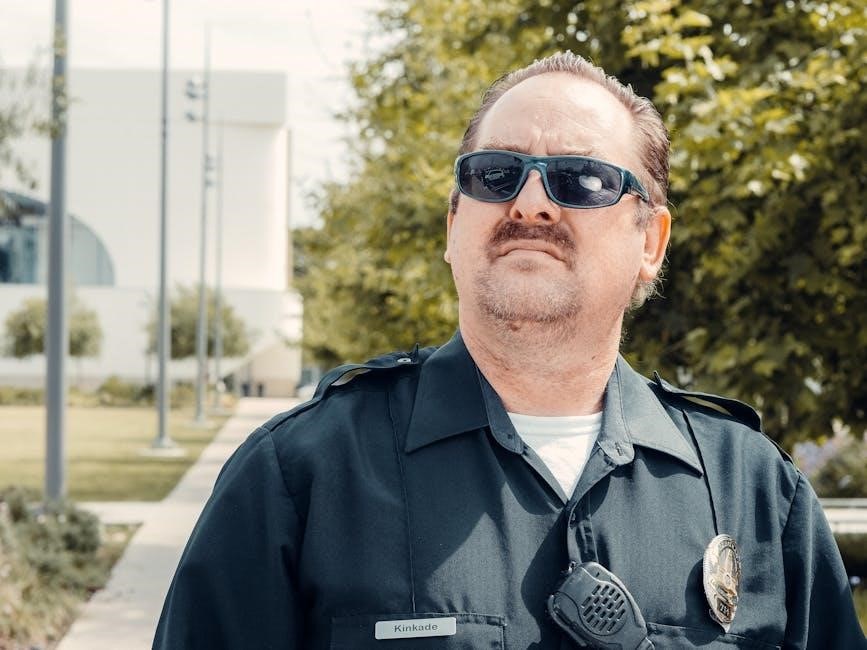
Legal and Ethical Responsibilities of Security Guards
Security guards must understand local laws, respect human rights during actions, and conduct duties ethically to avoid legal issues and ensure fair treatment of individuals.
7.1. Understanding Local Laws and Regulations
Security guards must thoroughly understand and comply with local laws and regulations to ensure their actions are legal and appropriate. This includes knowing their authority limits, such as when and how to conduct searches or detain individuals. Familiarity with specific statutes regarding trespassing, theft, and assault is essential to avoid overstepping bounds. Guards should also stay updated on changes in legislation that affect their duties, such as privacy laws or use of force policies. Understanding these legal frameworks helps guards perform their roles effectively while minimizing the risk of legal repercussions. Proper training and regular updates on legal requirements are critical to maintaining compliance and professionalism in their responsibilities.
7.2. Respecting Human Rights During Security Actions
Security guards must respect human rights during all security actions, ensuring that their conduct aligns with ethical and legal standards. This includes avoiding excessive force, respecting privacy, and treating individuals with dignity, even in high-stress situations. Guards should be trained to handle incidents without violating personal rights, such as during arrests, detentions, or searches. Understanding and adhering to human rights principles helps build trust between security personnel and the communities they serve. Respecting these rights is not only a legal obligation but also a moral duty, fostering a safe and just environment for everyone involved.

The Future of Security Guard Roles
The future of security guards involves integrating advanced technology, such as AI and drones, while expanding roles in community safety, collaboration, and proactive risk management strategies.
8.1. Integration of Technology in Security Operations
The integration of technology in security operations is revolutionizing the role of security guards. Advanced systems like AI-powered surveillance cameras, facial recognition software, and automated alarm systems enhance monitoring capabilities. Drones and robotic patrols are being deployed to cover large areas efficiently. Additionally, digital communication tools and real-time data analysis enable quicker response times and better decision-making. Security guards now rely on technology to predict and prevent threats, reducing human error. This shift not only improves security outcomes but also streamlines operations, allowing guards to focus on strategic tasks. As technology evolves, the synergy between human expertise and digital solutions will become indispensable in modern security practices.
8.2. Expanding Roles in Community Safety
Security guards are increasingly taking on broader roles in community safety, extending beyond traditional premises protection. They now often assist in public events, disaster response, and neighborhood watch programs. Guards collaborate with local law enforcement to address issues like vandalism, theft, and public disturbances. Additionally, they provide education on safety practices and emergency preparedness to the community. This expanded role fosters trust and cooperation between guards and residents, creating a safer environment. By engaging actively in community safety initiatives, security guards contribute to crime prevention and enhance overall well-being. Their visibility and approachability make them invaluable assets in building secure and resilient communities. This evolution underscores the growing importance of security personnel in maintaining public safety and fostering a sense of security beyond their traditional duties.